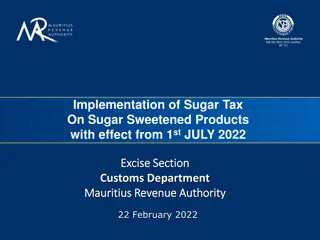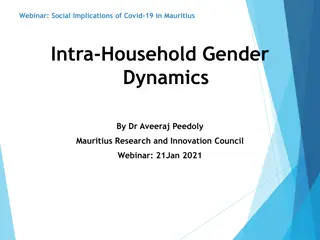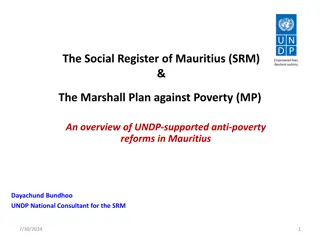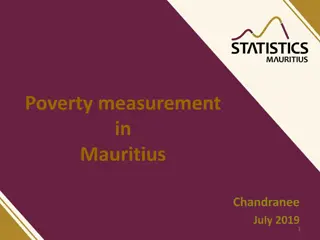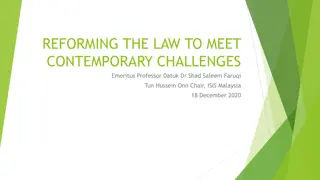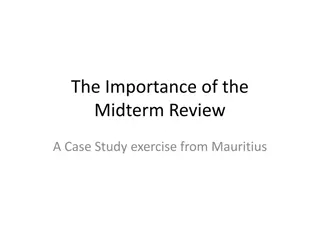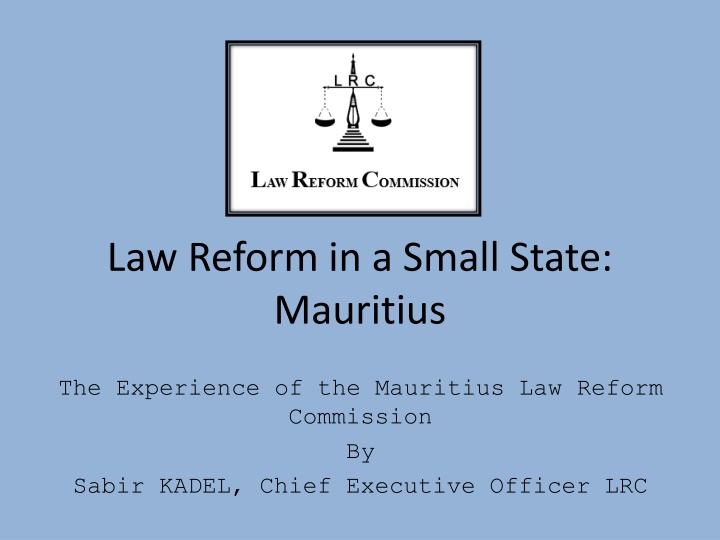
Mauritius Law Reform Commission: Decolonizing Through Legal Evolution
Experience the journey of the Mauritius Law Reform Commission in decolonizing the legal system, addressing outdated laws, and engaging stakeholders for a just and sovereign society. Discover the importance of law reform in a small state like Mauritius and its impact on shaping the future through rigorous analysis and inclusivity.
Download Presentation

Please find below an Image/Link to download the presentation.
The content on the website is provided AS IS for your information and personal use only. It may not be sold, licensed, or shared on other websites without obtaining consent from the author. If you encounter any issues during the download, it is possible that the publisher has removed the file from their server.
You are allowed to download the files provided on this website for personal or commercial use, subject to the condition that they are used lawfully. All files are the property of their respective owners.
The content on the website is provided AS IS for your information and personal use only. It may not be sold, licensed, or shared on other websites without obtaining consent from the author.
E N D
Presentation Transcript
Law Reform in a Small State: Mauritius The Experience of the Mauritius Law Reform Commission By Sabir KADEL, Chief Executive Officer LRC
Introduction: The Movement of History History shapes the present and defines the future. The colonial legacy continues through unresolved issues like the Chagos Islands. Law reform is a means of completing decolonisation. Repealing archaic ensures justice sovereignty. laws and Fukuyama was wrong!!!
The legacy of colonial rule extends beyond mere geography, it is deeply embedded in our legal systems. It endures within statutes and codes that have remained unaltered long after the colonial banners were lowered. In small states, the mission of law reform agencies is, at its core, a continuation of the decolonisation process undertaken through political upheaval, but through the meticulous dismantling of legal vestiges that no longer serve a just and sovereign society. not
I. Mauritius Law Reform Commission (LRC) Established under the Law Reform Commission 2005. Independent statutory body ensuring laws remain just and relevant. Functions: Reviewing outdated laws; Proposing reforms based on human constitutional principles; Engaging stakeholders for participatory law reform. Act rights and
The Commission has the power inter alia to: Initiate proposals for the review, reform or development of any aspect of the law of Mauritius and to receive and consider any such proposal made or referred to it by the Attorney-General or any other person; Conduct public hearings, seek comments from the public on its proposals, and consult any person or class of persons; Request information from any Government department, any organisation or person in relation to the review, reform or development of any aspect of the law of Mauritius; and Publicise such parts of its work in such manner as it thinks expedient.
The working methodology of the LRC embodies a commitment to both rigour and inclusivity. At its core lies comparative legal analysis, which enables us to assess Mauritian laws in light of international standards and best practices. However, our approach is not one of mere legal transposition, we do not adopt foreign models uncritically. Instead, we examine how similar challenges have been addressed across diverse legal systems, carefully evaluating which solutions can be tailored to our unique legal framework and socio-cultural realities. This ensures that our reforms are both globally informed and locally grounded.
LRC Recommendations Since 2006 186 Reports and Papers submitted to the Attorney-General with recommendations for change Category Details Strengthening the Rule of Law & Human Rights Rule of Law, Good Governance, Human Rights Protection Improving Judicial System & Legal Services Enhancing legal profession, settlement of disputes Modernising Civil Justice System Reforming outdated civil procedures Modernising Criminal Justice System Criminal procedures, Bail laws, Jury trials, Disclosure, Costs, Evidentiary rules, Review of miscarriages of justice Renovating Criminal Law Updating Criminal Code, offences, supplementary acts Modernising Code Civil Mauricien Law on persons, family law, obligations, contracts, property law, private international law Improving Business Legal Infrastructure Reform of Code de Commerce, real estate regulations, consumer protection, Cape domestication Town Convention
II. Dismantling Colonial Legal Vestiges Colonial laws persist in Mauritius' legal framework. Some outdated provisions include: (A) Section 242: "Crime of Passion" defense Manslaughter committed by any person on his spouse, as well as on his accomplice, at the very moment he finds them in the act of adultery is excusable. (B) Section 250: Criminalisation of consensual sodomy Any person who is guilty of the crime of sodomy or bestiality shall be liable to penal servitude for a term not exceeding 5 years. (C) The Persistence of Provisional Charges in Mauritian Criminal Procedure LRC aims to modernise these laws for justice and equality.
(A) Repealing Section 242: Crime of Passion Allows reduced punishment for killing a spouse caught in adultery. Rooted in patriarchal notions of honor and possession. Reinforces gender-based contradicts equality principles. LRC advocates repeal to ensure homicide is treated equally in all cases. violence and
This legal doctrine is not merely outdated; it is inherently perilous. By enshrining in law the notion that emotions especially jealousy and betrayal can serve as a partial justification for taking a human life, it legitimises and perpetuates gender- based violence. Such a provision is fundamentally at odds with contemporary principles of gender equality, human rights, and due process, all of which require that homicide be adjudicated consistency, without regard to the perpetrator s emotional state. Murder must be recognised for what it is an act that demands full accountability under the law. with unwavering
(B) Reforming Section 250: Decriminalisation of Consensual Sodomy Colonial-era law sodomy. Rooted in Victorian morality rather than indigenous legal traditions. Supreme Court decriminalised sodomy in 2023 between consensual male adults (Ah Seek v State of Mauritius). LRC proposed a consent-based approach to legal reform. criminalised consensual
Insertion of a new Section 47 in the Mauritian Criminal Code (a) Notwithstanding any provision in this Code to the contrary, any act between consenting adults, where the individuals have the capacity to give consent, shall be deemed to be lawful, provided that such act: (i) Does not result in non-consensual harm to others; (ii) Does not involve coercion, duress, manipulation, or undue influence; and (iii) Does not violate public order or public policy. (b) For the purpose of this section, consent shall mean the free and informed agreement to the act by the person concerned. (i) Consent must be established at every stage of the act. It must be ongoing, freely given, informed, and reversible at any point. (ii) An individual is incapable of giving consent if the individual is incapacitated due to the use of drugs or alcohol, or is unable to understand the nature or condition of the act.
The proposed Section 47, inspired by Section 228 of the German Criminal Code, seeks to enshrine a fundamental legal principle that prioritises consent and individual autonomy. This provision would effectively decriminalise consensual sodomy under Section 250 of the Mauritian Criminal Code by affirming that any act between consenting adults is lawful, provided specific safeguards are met. By establishing a clear standard, the new provision would override conflicting sections of the Criminal Code, ensuring that individuals engaging in private, consensual conduct are not subjected to criminal prosecution, thereby aligning Mauritian law with modern human rights principles.
(C) Doing away with provisional charges A significant legal anomaly in Mauritius is that no statute explicitly recognizes or defines the concept of a provisional charge. Yet, it remains widely used by the police and has been accepted by the judiciary as a de facto part of the criminal justice system. Despite the absence of any explicit legal provision authorizing their use, "provisional charges" remain a distinctive and controversial feature of the Mauritian criminal justice system. Rooted in British colonial legal traditions, this practice has persisted without a clear statutory basis, allowing for frequent abuse by law enforcement authorities. The lack of judicial oversight and defined procedural safeguards has resulted in numerous instances of arbitrary arrest and extended detentions without proper cause. The Law Reform Commission of Mauritius has recognized these deficiencies and has advocated for the introduction of legislative reforms akin to the UK sPolice and Criminal Evidence Act 1984 (PACE), which governs police investigations, arrests, and charging procedures with a strong emphasis on safeguarding the rights of suspects. This note examines the legal vacuum surrounding provisional charges, their abuse by the police, and the urgent need for legislative reform in light of comparative experiences, particularly the UK, France, and South Africa.
The abolition or reform of provisions such as Sections 242 and 250, and doing away with provisional charges is not an isolated initiative, it is part of a broader imperative to purge our legal system of colonial remnants that no longer serve a legitimate purpose. These laws were not designed to safeguard the rights of the local population but were imposed by colonial rulers to enforce a moral and social order detached from the realities and values of the people they governed. Their continued existence is anachronistic, and their repeal is essential to ensuring a legal framework that reflects justice, equality, and the sovereignty of our nation.
III. Future of Law Reform in Mauritius Strengthening impact. Expanding collaborations. Promoting people-centric law reform. Ensuring laws reflect contemporary values and societal needs. LRC s independence and regional and Commonwealth
Conclusion Law reform in small states is crucial for sovereignty. LRC ensures outdated, repealed. Reforming laws is a moral and historical responsibility. The law must evolve to reflect modern principles of justice. unjust laws are
13th Floor, SICOM Building II Reverend Jean Lebrun Street Port Louis, Republic of Mauritius Tel: (230) 212-3816/212-4102 Fax: (230) 212-2132 E-Mail: lrc@govmu.org URL http://lrc.govmu.org Thank you!



